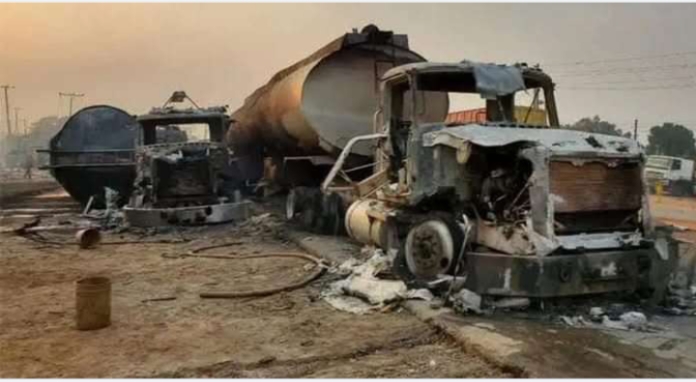Another fuel tanker explosion, this time in Enugu, has claimed lives and left others injured. These are not just numbers—these are parents, children, friends, and loved ones whose lives have been cut short in yet another preventable tragedy. It’s heartbreaking and frustrating to see these incidents happen over and over again, with no real solution in sight.
The truth is, this isn’t the first, and sadly, it won’t be the last if nothing changes. Just in the last two weeks, we’ve had similar crashes in the Northwest, Southwest, and now the Southeast. These fuel tanker explosions are happening far too often, and yet the roads remain dangerous, the tankers remain unchecked, and lives continue to be lost.
The problem is glaring. Many of these tankers are old, poorly maintained, and shouldn’t even be on the road. The drivers, in many cases, are inexperienced or careless, speeding recklessly with hazardous materials. There’s barely any regulation. Who checks the state of these vehicles? Who ensures these drivers are qualified? Where are the safety standards?
A simple solution could be to restrict tanker movements to nighttime hours, from 12 a.m. to 5 a.m. This would reduce daytime traffic and minimize casualties if an accident occurs. Why this hasn’t been enforced across the country remains a mystery. It’s a practical and immediate step that could save countless lives.
But let’s be honest—this problem goes deeper than restricting tanker movements. The real issue is our overdependence on tankers for transporting fuel. In countries with proper infrastructure, pipelines and railways handle such tasks. It’s safer, more efficient, and eliminates the risk of these horrific accidents. Why can’t we have the same here? Why can’t we invest in modern solutions that prioritize safety?
And then there’s the issue of accountability. Tanker owners must be held responsible for their vehicles and the drivers they hire. If a tanker causes an accident due to poor maintenance or recklessness, the owner should face serious consequences. A system of strict penalties and oversight would force these operators to step up.
We, as citizens, also have a role to play. It’s heartbreaking to see people rush to scoop fuel from fallen tankers, knowing full well the dangers involved. This isn’t just risky—it’s deadly. Public awareness campaigns are needed to educate people on the consequences of such actions. No amount of free fuel is worth a human life.
It’s time for the government to act. These explosions aren’t just “accidents”; they’re a direct result of neglect, poor planning, and a lack of enforcement. The death toll from tanker crashes is becoming as alarming as that of insurgencies, yet it feels like no one in power is paying attention.
Nigeria needs stricter regulations, better infrastructure, and real accountability. Tankers should not be allowed to continue claiming innocent lives because of systemic failures. These tragedies are preventable, and the solutions are clear. What we need is the will to make them happen.
How many more lives must be lost before something is done? How many more families must grieve before we realize that enough is enough? This is a call to action—for the government, for tanker owners, and for every Nigerian. We can’t keep living like this. Lives are too precious to be wasted on something that can be fixed. Let’s fix it now.
Abu can be reached via danjumaabu3750@gmail.com or +2348062380296



